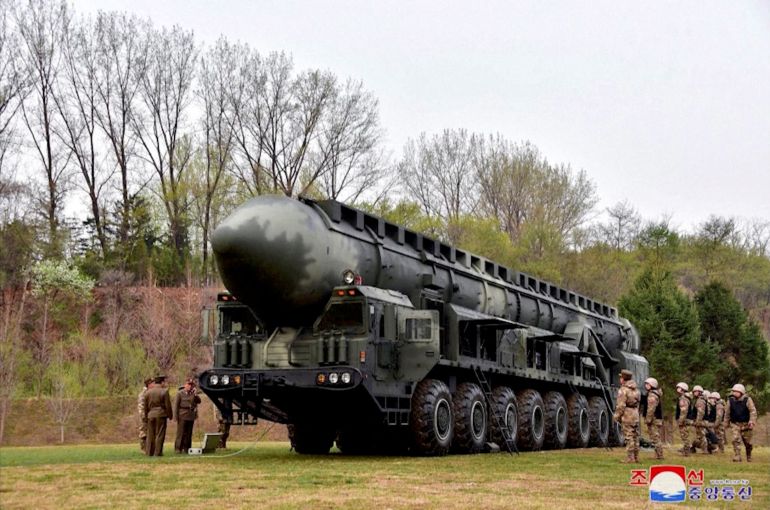In latest development of his weapons arsenal, Kim supervised the test of a new solid-fuel rocket engine for North Korea’s ICBMs.
Published On 9 Sep 2025
North Korean leader Kim Jong Un has overseen a test of a new rocket engine designed for intercontinental ballistic missiles (ICBMs) that he described as marking a “significant change in expanding and strengthening” the country’s strategic nuclear forces.
The country’s official Korean Central News Agency (KCNA) reported on Tuesday that the successful test marked the ninth and final ground test of the solid-fuel rocket engine, built with carbon fibre and capable of producing 1,971 kilonewtons of thrust – a measure of propulsive force which is more powerful than earlier North Korean rocket engines.
Recommended Stories
list of 4 itemsend of list
The KCNA said that Kim expressed satisfaction after Monday’s test, calling the “eye-opening” development of the new rocket engine a “significant change” in North Korean nuclear capabilities.
The announcement that tests on the solid-fuel rocket are now complete comes a week after Kim visited the research institute that developed the engine, and where he unveiled that a next-generation Hwasong-20 ICBM is currently under development.

The development of North Korea’s ICBM arsenal adds to Pyongyang’s efforts in recent years to build weapons that pose as a viable threat to the continental United States, according to defence analysts.
Pyongyang’s nuclear ambitions are seen as a means to bolster North Korea’s status as a nuclear power and give it leverage in negotiating economic and security concessions with the US and other world powers.
North Korea also marked the 77th anniversary of its founding on Tuesday, by the current leader’s grandfather, Kim Il-sung.
In a separate report, KCNA said that Chinese President Xi Jinping sent a congratulatory letter to Kim and called for strengthened “strategic communication” between Beijing and Pyongyang.
“The Chinese side is ready to join hands in promoting the China-DPRK friendship and the socialist cause of the two countries through the intensified strategic communication and brisk visits and close cooperation with the DPRK side,” Xi wrote, using the acronym for North Korea’s official name, the Democratic People’s Republic of Korea.
Last week, Kim joined Russian President Vladimir Putin and Xi in Beijing for China’s Victory Day Parade commemorating the end of World War II.
Analysts have said that the rare trip to an international gathering of world leaders was a diplomatic win for Kim, who has fortified his alliance with Russia and China.